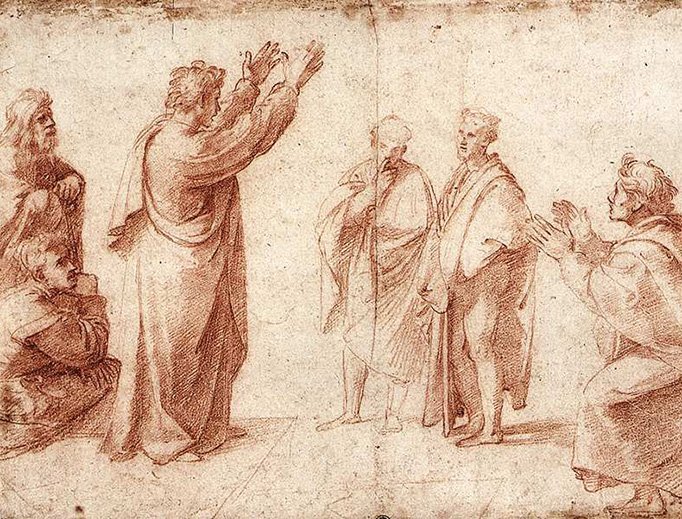The Genealogies of Modernity Journal
On Divine Space
There is a genealogical case to be made that the solidity of the modern scientific world picture may have been unwittingly grounded upon a theistic metaphysic.
JD Lyonhart on Henry More and the origins of modern space
Petrarch's Augustinian View from Mont Ventoux
Petrarch was a founder of an alternative modernity, which emphasizes the compatibility between the ancients and medievals by adhering to the traditional prioritizing of the contemplative over the active.
Michael Krom on spiritual ascents
Forever Young: Hannah Arendt and Natality
If we lose track of natality, newness, and birth, we will ourselves become gray-haired obstructers of the new. Genealogists do not just trace the past. We are students of birth.
Terence Sweeney on genealogy and old age with Arendt and Nietzsche
Tradition is Apocalyptic
The unity and coherence of Christian tradition is derived from the antecedent finality of its futural fulfilment and can’t be secured by appeal to a procrustean deposit of faith perduring through history.
Jack Pappas reviews David Bentley Harts’s Tradition & Apocalypse
Portable Mass Kits and American Catholics in WWI
The patriotism and religious piety felt by U.S. Catholics during WWI through efforts to supply devotional objects paved the way for the solidification of American Catholic identity.
Sarah Luginbill on portable altars and Catholics becoming American
The Angel in the Top-Hat
This case illustrates the complex entanglement of enchantment and disenchantment in the 19th century, a dynamic participated in by Church and State, physicians and spiritualists—and angels in top-hats, too.
Richard Yoder on an angelic apparition
What Were the Women Up To?
While Benjamin Lipscomb cannot be criticized for failing to say everything relevant on this history, it is worth noting that there may be a richer and longer history to be told here.
Nicholas Sparks reviews The Women Are Up to Something
Jansenist Orientalism
Jansenist Orientalism, a sub-species of ‘Catholic Orientalism,’ matters as a French tributary to religious modernity as such—the overlooked contribution of a prominent if persecuted minority.
Richard Yoder on Orientalism in early modernity
Augustine, Violence, and the Novelty of Machiavelli
Machiavelli follows Augustine by demythologizing violence, stripping it of the gloss of legend and heroism. He departs from him by adding that it is necessary, excusable, and worthy of imitation.
Brian Harding on violence and political reality
Spiritual Abuse and Orthodox Disavowal
Perhaps the task of history, so like that of the Gospel, is to disquiet the living with a persistent presence that rises from the dead.
Richard Yoder reflects on Jansenism and the Refusal of Sacraments controversy
Deferring the End
Religion, and the apocalyptic motifs of the Christian Gospels, is that which alone can send us back into the world with a renewed strength for political engagement and activism.
Tim Howles on the eschatological roots of political renewal
Holding Open the Present
When the concept of the katechon is handled by contemporary theorists, it takes on a disappointingly conservative hue. . . . There seems to be little room for political activisms that might challenge the status quo.
Tim Howles on the eschaton and political theology
A Genealogy of Death
The happy skeletons smile, as if to say, “I am alive, I am well, and death is not the end.” For Jorge Portilla, like Socrates before him, a good and meaningful life requires the endorsement of life after death.
Brian Harding on philosophies of death from Greece to Mexico
The Sacredness of the Person
Only a dialectical approach between the Enlightenment and Christianity is capable of grasping the historical dynamics of the emergence of human rights within the European context.
Sharon Kuruvilla reviews Hans Joas’s The Sacredness of the Person
An Essential Romantic: On Dorothea Veit-Schlegel
Dorothea Veit-Schlegel shared some commitments with male Romantics, but she critiqued many of their central ideas, especially in relation to gender, education, and personal development.
Anna Ezekiel recovers an essential Romantic thinker and writer
The Extraordinary Marie Magdeleine Davy
Despite their imperfections, mystical texts are worth keeping alive in modernity—particularly in periods of authoritarianisms and violence—because they offer glimpses of other possibilities.
Brenna Moore on the life and work of a great figure of the Ressourcement
A Counter-Modern Intellectual Life
That Sertillanges finds these practical matters necessary for someone to live a properly intellectual life reveals a key insight: the intellectual is a human being, and a human being is more than just a spiritual soul.
Brs. Christopher Daniel and John Henry Peters on the intellectual vocation in the modern world
Theological Genealogy and the Undoing of Knots
The intended use of problematization is to recognize knots in order to be able to undo them. The undoing of the knots is beyond the scope of problematization, beyond the scope of scholarship.
Ryan McDermott considers theological genealogies of modernity
Keeping Tradition Alive
The arduous, the precarious measure of a tradition’s renewal is the measure of our own lives, in our own responses to the one thing necessary. It is we ourselves who look back, and it is we who look forward.
Anne Carpenter on living tradition in Charles Péguy and Maurice Blondel























